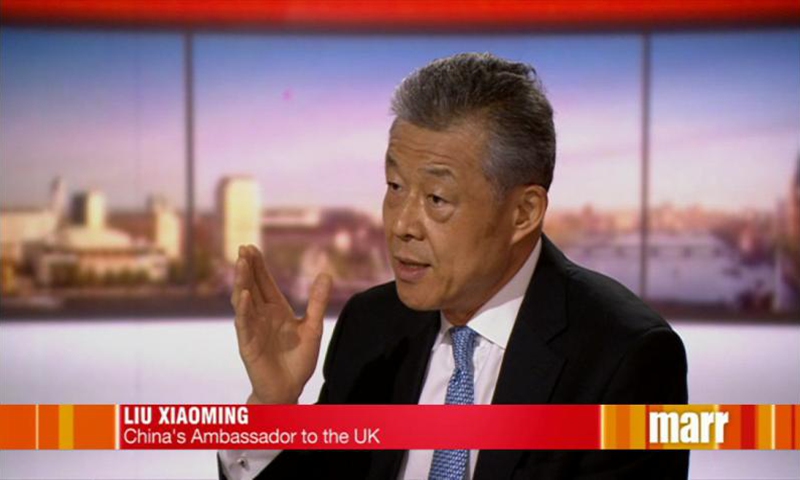Chinese envoy urges UK to have independent policy rather than 'dance to tune of Americans'

Chinese Ambassador to the UK Liu Xiaoming
It would be a totally wrong decision for the UK government to impose unilateral sanctions on Chinese individuals and if the UK government goes as far as imposing sanctions on any individual in China, China will certainly make a resolute response to it, Chinese Ambassador to the UK Liu Xiaoming said in an interview on Sunday.He made the remarks in response to a question regarding the UK government's possible plans to end its extradition treaty with Hong Kong and sanction Chinese individuals.
The latest Huawei ban in the UK has already sent shockwaves among scholars and business representatives in the UK and China, who are deeply wary of the potential severe consequences of souring bilateral ties between the two countries.
Ahead of US Secretary of State Mike Pompeo's visit to the UK on Monday, UK Foreign Secretary Dominic Raab has been escalating his harsh rhetoric on China by hinting that the British government is preparing to follow Canada and Australia in ending its extradition treaty with the Hong Kong Special Administrative Region (HKSAR).
Such a move is seen as "symbolic," as the UK has followed the US in voicing its rejection of the recently passed national security law for Hong Kong. UK's possible move is also highly dangerous as it is very likely to further undermine the UK-China relationship, observers said.
"That is totally wrong. We never believe in unilateral sanctions," Liu said in the interview.
We believe that the UN has the authority to impose sanctions, and if the UK government goes as far as to impose sanctions on any individual in China, China will certainly make a resolute response to it, the ambassador said.
John Lee Ka-chiu, Hong Kong Secretary for Security, has harshly criticized some countries that intended to drop extradition agreements with the HKSAR in opposition to the national security law for Hong Kong, claiming "it is a highly irresponsible move that undermines the rule of law."
However, law enforcement authorities in the HKSAR and in the Chinese mainland will always be able to hold fugitives accountable through different measures, such as international police cooperation, or other ways, he told the Global Times in a recent interview.
The HKSAR has extradition agreements with some 20 countries, including the US, the UK, Canada, Australia and Germany. Half a month after the national security law came into force, Canada became the first country to announce it was ending the treaty with the HKSAR.
"You've seen what happened between China and the US. They sanctioned Chinese officials. We sanctioned their senators and officials. I do not want to see this tit-for-tat between China and the US happen in China-UK relations," Liu said, noting that the UK should have its own independent foreign policy rather than dance to the tune of Americans, citing UK's decision on Huawei.

